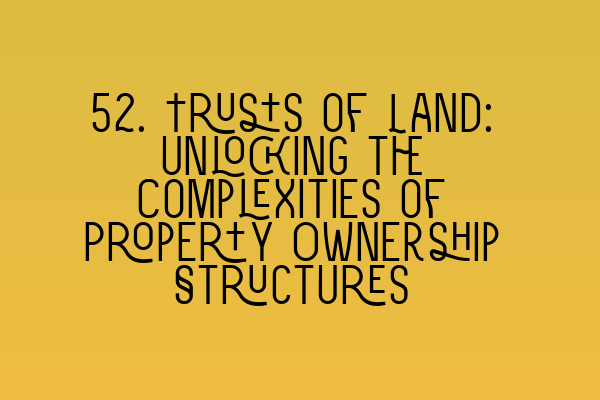52. Trusts of Land: Unlocking the Complexities of Property Ownership Structures
When it comes to property ownership structures, things can get quite complex. One of the key aspects that can further complicate matters is the inclusion of trusts. Trusts of land play a crucial role in property law, enabling individuals to hold and manage property on behalf of others. In this blog post, our team of expert solicitors at SQE Property Law & Land Law will shed light on the intricacies of trusts of land and provide valuable insights to help you navigate through this complex area.
What is a Trust?
A trust is a legal arrangement where a person, known as the trustee, holds and manages assets on behalf of another person, called the beneficiary. The trustee has a fiduciary duty to act in the best interests of the beneficiary and manage the assets in accordance with the terms of the trust deed. Trusts are commonly used in estate planning, asset protection, and property ownership structures.
Trusts of Land
Trusts of land specifically deal with property ownership and management. They can be created in various ways, including through express trusts, resulting trusts, and constructive trusts. Express trusts are created through a formal document or deed, while resulting and constructive trusts may arise from the circumstances surrounding the property transaction.
One of the key reasons for creating a trust of land is to separate legal ownership from beneficial ownership. This can be particularly useful in scenarios where multiple individuals have an interest in a property, such as in co-ownership or investment structures. By creating a trust, the legal title to the property is held by the trustee, while the beneficiaries hold the beneficial interest.
The Importance of Trustee Duties
Trustees have specific duties and responsibilities when it comes to managing the trust property. These duties include acting in the best interests of the beneficiaries, exercising a duty of care and skill, avoiding conflicts of interest, and maintaining accurate records. Breach of these duties can lead to legal consequences and potential liability for the trustee.
Understanding Trusts of Land in Property Transactions
In property transactions, trusts of land can add complexity due to the presence of multiple parties with differing interests. It is essential to carefully consider and address the interests of beneficiaries when buying, selling, or transferring property held in trust. Proper documentation, such as trust deeds or declarations of trust, should be prepared to ensure the interests of all parties are protected.
When purchasing a property held in trust, it is crucial to investigate the trust structure and understand the nature of the beneficial interests. This may involve reviewing trust documents, obtaining consent from all beneficiaries, and ensuring compliance with any restrictions or requirements imposed by the trust.
Similarly, when selling or transferring a property held in trust, all beneficiaries should be involved in the decision-making process. Obtaining the necessary consents and ensuring proper legal documentation is in place is essential to prevent any disputes or challenges in the future.
Seeking Legal Advice
Given the complexities involved in trusts of land and property ownership structures, seeking legal advice is highly recommended. A professional property law solicitor can provide expert guidance and assistance in navigating through the intricacies of trusts and ensuring compliance with legal requirements.
At SQE Property Law & Land Law, our team of experienced solicitors specializes in property law matters, including trusts of land. We have a deep understanding of the legal complexities surrounding property ownership structures and can provide comprehensive advice tailored to your specific situation.
If you require assistance with trusts of land or have any other property law-related queries, feel free to contact us. Our dedicated team is here to help you.
For further information about the SQE exams, visit our related articles:
- SQE 1 Practice Exam Questions
- SQE 1 Practice Mocks FLK1 FLK2
- SQE 2 Preparation Courses
- SQE 1 Preparation Courses
- SRA SQE Exam Dates
